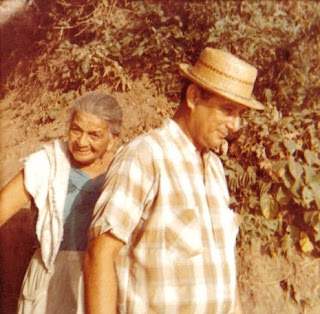 |
Back in December 1983
some 20 years before his death |
My father was my hero not because of any medals or because he was all powerful and knowledgeable. His weakness did not make him less of a man for me. He succumbed to that weakness because he was a man, a human being. It was a failing of him, but he was not a failure. He proved it by confronting the failing brought about by his weakness, and by not letting it subdue him, by rising every time after the fall.
There are things, areas where I wish I had his strength. For all the satisfaction that I am sure he got out of seeing me, us, his children, succeed or do things right, there may have been dismay or disappointment on seeing us fail. Not because we displeased him, I'd venture, but because he knew we could do better [the pix here is from December 1983].
In essence, he taught us to be ourselves. Which is probably how it should be, I think. You start comparing yourself to people and inevitably there will be differences.
Let me just exemplify.
He was frugal where I’ve been profligate.
While I am a total klutz with manual chores, either for home repairs or at fixing automotive engines, he was dexterous. Ambidextrous, as a matter of fact.
How skilled on using either hand? He would like there was nothing to it start working on an engine, say dislodging a stubborn spark-plug on the driver side by manipulating the wrench with his right hand, and without missing a beat and barely shifting his body transfer the wrench to his left hand and effortlessly start working on the opposing plug on the passenger side.
The dexterity had been forced upon him. Left-handed at birth, he learned the use of his right hand back at the little private school that he had been sent in as a child.
Learned, I said, but read rather he was tormented into. The owner-principal-lone-teacher sat him on a chair, tied the left arm to his side and gave him a pencil. Cruel perhaps even by the standards of the end of the 1920s, which is when all this happened. He was matter-of-fact whenever he told this story.
By the time his schooling ended he had for all practical purposes lost his left-handedness. His calligraphy [because there was such a thing to learn when he was little] was almost impeccable and unless you knew the story nothing on how he handled himself would betray the fact that he was not born right-handed.
None of us his three children inherited the left-handed gene although all my three children did. That pleased him to no end. It’s not as boastful as it may sound. Just the fact that our children were his grandchildren was good enough for him. On those not frequent enough occasions when the telephone would bring us again together at a distance nothing was more important to him than to know what was happening with each one of them. “How’s ‘Hummingbird,’ still taking dance classes?” he would ask.
Distance for one, as well as my own failings conspired and there was at the end from my children’s side less than the reciprocity I would have liked.
By moving away, I sheltered them from the danger that armed strife represented. In the process, and it doesn’t really matter how hard you try to keep the connections open, the family that nurtured you becomes a stranger to the one you are caring for.
This is neither a recrimination nor a complaint, and certainly not a grievance, just a simple fact of life. In the end is actually nothing to dwell on; unfamiliarity is after all a killer.
Any recriminations after all I would have to direct to myself. Measures, decisions I once thought to be pragmatic, convenient, smart ones, turned out to be wrong.
I saw him last in February 1998, a few weeks after the second time I saw him cry: It was at the hospital where he had been operated on for prostate cancer.
Not that those were the only two times he cried.
Years before, a few weeks before the threats to my safety materialized in an attack that imperiled the life of my second child, he took me to the airport. Tears swelled in his eyes, my mother told me, on their way back home after seeing me depart.
And so it was that in April 2004, when cancer finally put an end to his life, I was absent. Could never comfort him nor bid goodbye to him in person. My lasting memory of him this disembodied voice that faltered, as mine did, during our last phone chat.
And so it is then that I remember him and his emotions. It is so then that I cry. Not because he died. I cry. Because I miss him.







